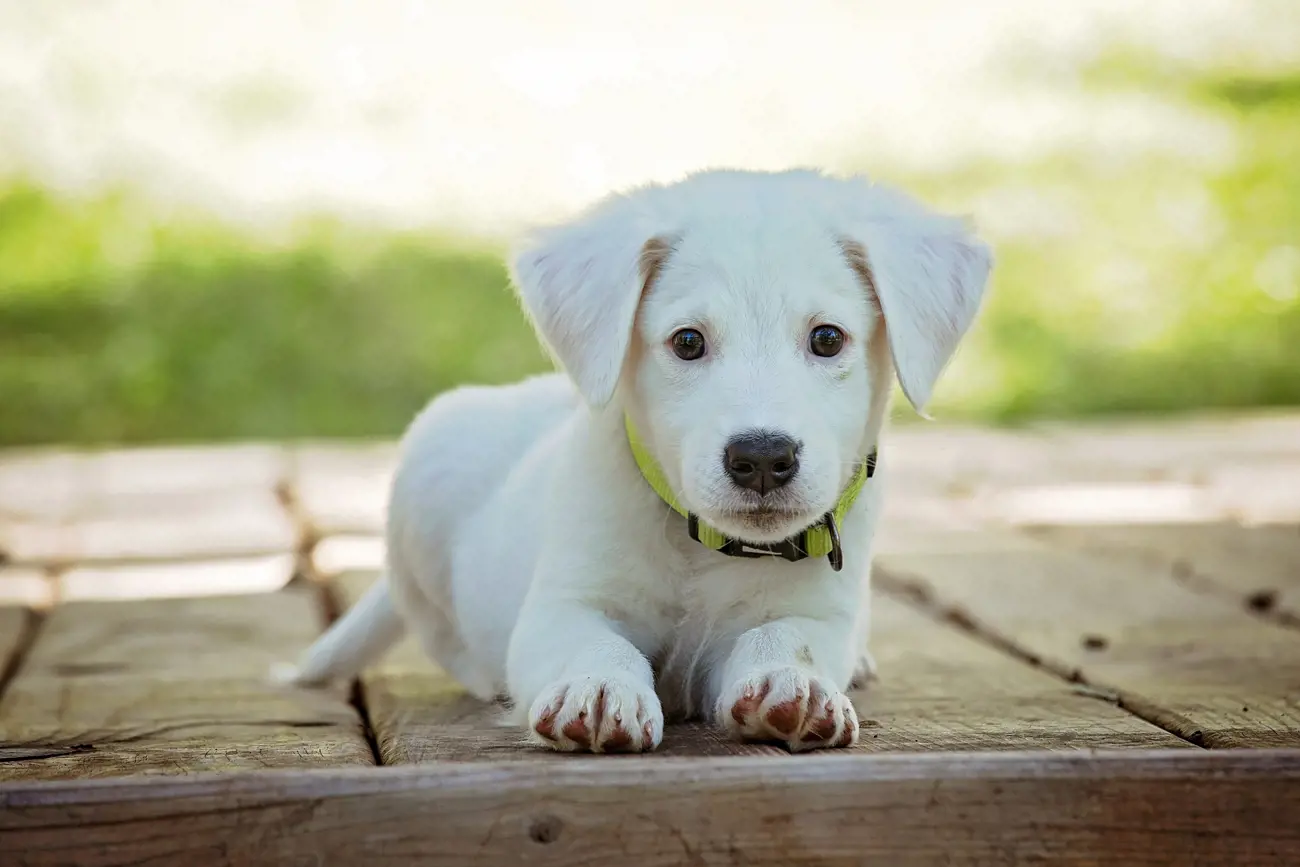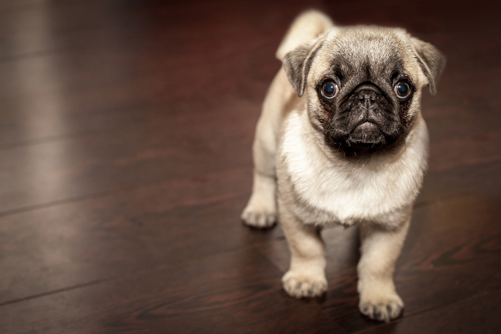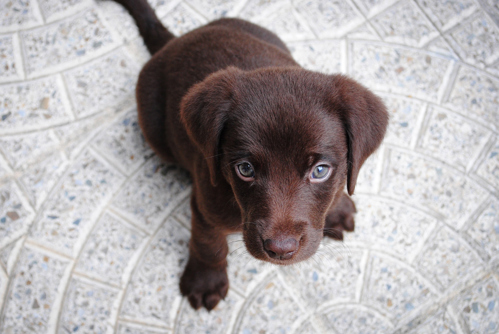How to stop your puppy urinating when it's excited
16th October, 2020

Does your dog occasionally wee when it shouldn't, despite being house trained?
If your puppy or grown-up dog has a tendency to pee at inappropriate moments, the good news is that you can probably train them out of it – but it will take patience and understanding as they won't lose the habit overnight.
With puppy insurance from Purely Pets, you'll have free access to our 24-Hour Vet Helpline for any queries regarding your pet’s health.
Why does my puppy pee on the floor?
When dogs occasionally pee on the floor for no apparent reason, it's usually because of submissive or excitement urination. These are two different triggers, although the outcome is the same.
Highly excitable puppies can sometimes wee when you come home or when they meet new people. This is known as excitement urination, and it can also happen during very active play.
Most dogs grow out of it, but there’s plenty you can do to help change their behaviour.
Submissive urination happens with dogs or puppies who are submissive and want to show that they are not a threat. It is common in rescued dogs and shy, anxious and timid canines.
It mainly occurs in puppies, but can also be a problem in adult dogs. Again, consistency and patient training can put a stop to the problem.
If your dog urinates indoors or at inappropriate moments, it’s important to visit your vet to rule out medical causes before trying behaviour modification.
Tests can show whether your four-legged friend has a urinary tract infection, cystitis or bladder stones, for example.
Your vet will also check for any signs of kidney disease or diabetes, both of which can lead to inappropriate or excessive urination.

How to stop inappropriate urination
Excitement urination
As the Kennel Club explains, puppies need to go to the loo every one to two hours and can spontaneously wee if they feel excited.
To help your puppy with excitement urination, Highway Veterinary Hospital offers the following tips:
-
Stay calm and quiet when greeting your dog. Avoid eye contact, crouch down to their level, and stay neutral.
-
Similarly, when you have guests come over, ask them to stay calm and keep greetings with your dog to a minimum.
-
Take your pup outside and give them praise and treats after they urinate.
-
If you know that something big or exciting is going to happen, make sure they’ve fully emptied their bladder beforehand.
-
If/when they do pee excitedly, clean up the mess without a fuss. Don't reprimand or punish them, as this will make the problem worse.
If your dog often wees with excitement during active play, The Spruce Pets recommends keeping all playtime outside or on a specially prepared area of newspapers and puppy pads.
That way, if there is a little accident due to over excitement, it isn't a big deal.
When there's an accident, it's important to clean up any stains thoroughly, preferably using an enzymatic cleaner, so the dog doesn't smell the urine scent and think it's appropriate to pee in that area again.
Submissive urination
It may seem counter intuitive to us, but dogs that urinate submissively are trying to appease someone they see as socially dominant and to escape being punished.
Situations when submissive dogs may pee include when someone goes to pet them in a dominant position (i.e. looking the dog directly in the eye, bending from the waist, greeting the pup face on).
The dog may also roll over on its side or show its belly when greeting an unfamiliar person.
Your puppy is likely to grow out of submissive urination by the time they reach one year of age, even if you do nothing about it. However, it can be messy and unpleasant, and some dogs never grow out of it.
One thing that can help is building the dog's confidence by teaching it simple commands (sit, stay, come), and rewarding it after each success.
You should also interact with your dog using non-dominant postures, for example:
-
Avoid direct eye contact, approach your dog from the side, and sit on the floor or squat down to your dog's level rather than looming over the dog and bending down.
-
When petting your puppy, go under the chin or chest, rather than on top of the head or ears.
-
Keep greetings and play sessions low-key and play games that focus on toys rather than bodily contact.
Take your dog outside to relieve itself as soon as you get home, and always reward and praise your pup when it pees in the appropriate spot.
As with excitement urination, if your dog pees in the house, simply clean it up without fuss and go away.
Punishing submissive urination, even with just a loud verbal reprimand, will only make the problem worse by motivating the dog to submissively urinate in an attempt to make you less angry.

Training tips
If your dog urinates when people in public walk up quickly and reach out to pet it, the American Kennel Club recommends getting a friend or family member to work with you.
The helper should slowly approach up to about 10 feet away from the puppy and stop. If the dog urinates, try this step with the helper 15 feet away.
If the puppy does not urinate, go to the next step. At any point the puppy urinates, go back to the previous step.
Next, the helper should approach up to 5 feet away from the puppy and stop. If this is successful, move on to 3 feet, then 1 foot away.
When the helper is 1 foot away, they should hold out their hand and offer the puppy a treat. While the dog is eating the treat, the helper touches the puppy on the side, then removes their hand.
If the puppy is not willing to take food from a stranger, try a toy.
The next steps are:
-
Helper approaches, offers the treat, places their hand on the puppy, and pets.
-
When the puppy can do this with a familiar person, bring in a new helper.
-
Vary the places where you do this. You can also vary the position of the helper.
Ruling out other behaviours
If your pup's problem doesn't quite match the above, here are some other causes of inappropriate urination in dogs:
-
House training: A puppy under 12 weeks of age might not be house trained, or may not yet have developed bladder control, so they can’t hold it for long. An older dog may not know how to indicate to you that it needs to go outside to eliminate.
-
Urine marking: Some dogs deliberately urinate in the house because they are scent marking – perhaps because they want to claim territory or in response to frustration, stress or an anxiety provoking situation.
-
Separation anxiety: If your puppy only soils when left alone in your home, even for short periods of time, it may be due to separation anxiety.
As always, if you have any concerns about your dog's health, behaviour or well-being, talk to your vet.
Protecting your pup with pet insurance
With specialist pet insurance arranged through Purely Pets you’ll get cover for vets’ fees from £1,000 to £15,000 per year, depending on the cover level you’ve chosen.
We offer 15 cover levels, giving you the freedom to choose the right level of cover for you and your dog, and you can choose a low excess from just £60.
So why not get a quote for pet insurance today?
Policy benefits, features and discounts offered may very between insurance schemes or cover selected and are subject to underwriting criteria. Information contained within this article is accurate at the time of publishing but may be subject to change.
Frequently asked questions
Should I punish my dog for excited peeing?
Punishing your dog for excited peeing is not the most effective approach. It's important to understand that this behaviour is not a sign of disobedience, but rather an involuntary response triggered by excitement or fear.
Instead of punishment, consider positive reinforcement strategies to help manage their excitement levels. Training and patience are key in dealing with this issue. Remember, your furry friend doesn't mean to upset you.
Why does my puppy pee when they greet me?
It is absolutely normal for a puppy to pee a little when excited. This behaviour, technically termed as "excitement urination," is common in young dogs who haven't yet fully mastered bladder control. It's their adorable, albeit messy, way of expressing their joy and excitement. Puppies may not even be aware they're doing it and will likely outgrow this habit as they mature.
Is there anything that will stop a puppy from peeing in the house?
Dogs are creatures of habit and thrive on routine. By setting a fixed schedule for meals, playtime, and potty breaks, you create a pattern that your furry friend can follow. Using positive reinforcement during house training can also be beneficial.
Reward your dog when they do their business outside, reinforcing the idea that this is the correct behaviour.
Helpful Pages
Recent Posts
Pet Insurance Quote
- 98% claims paid *
- Claims paid directly to vets
- 24/7 vet video consultations
- Interest free monthly payments




